#jujutsu kaisne spoiler
Explore tagged Tumblr posts
Text
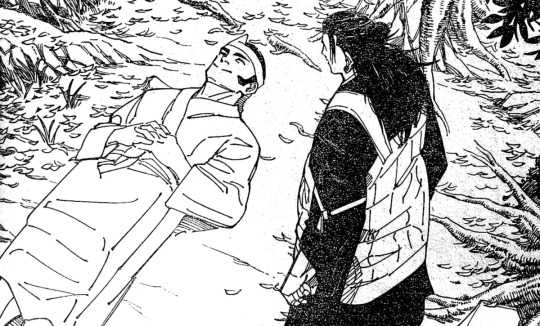
The Death of Kenjaku
So I was planning to write this meta the week that Kenjaku died, but decided to delay until we got full confirmation of his death. Something I didn't believe in even after Kenjaku passed the merger onto Sukuna. However, watching this video about death in Jujutsu Kaisen inspired me to finish this post. Not because I disagree with anything the YouTuber is saying, but because they can speculate on the meaning of so many deaths in Jujutsu Kaisen but can't find the meaning in Kenjaku's sudden death. This has led me to speculate why Gege made the choice to kill Kenjaku in the way that he did. What meaning is there in Kenjaku's abrupt and unsatisfying death?
Who is Kenjaku?
The first step in understanding Kenjaku's death is of course understanding how he lived. We actually know incredibly little about Kenjaku's character by design. Despite the fact he's literally in Geto's body, he's not meant to have sympathetic or human motivations to his actions (though hold onto that "human motivation" in your head for a moment). No flashback sequence shows the audience why this guy is the way he is, no single event seems to have driven him to do what he did.
This is what we know about Kenjaku in brief. He is a sorcerer who is over a thousand years old who was around in Sukuna's day. He once had a friendship with Tengen, but found her original self boring and unambitious. He also contrasts heavily with Tengen, who lives outside of humanity, because he has lived among humanity for 1,000 years. One of those lifetimes was Noritoshi Kamo who violated a woman and conducted heinous experiments. He produced ten children in his one thousand years, the nine death painting siblings and Yuji Itadori. He considers the first children boring, because human and curse hybrids turned out too normal.
He also partially blames himself for how boring they are, because he can't create anything that will exceed his expectations, the only thing that can exceed his expectations is born in chaos. He spent a thousand years organizing the culling games, and wants to use the games to create a merger, because he thinks creating a merger between Tengen and Humanity will create something entirely new and interesting. He also believes the way towards the future lies in further optimizing cursed energy, not in breaking away from it the way Yuki Tsukumo tried to do and Maki has.
The only people whose word we have on Kenjaku's motivations are Kenjaku himself, and Tengen's word and Tengen themselves who claims to not know what goes on in the human heart.

From all of the above Kenjaku seems to be a shallow character who's motivations can be summed up as "because I can" and "I want to see what happens." This shallowness is intentional however, as Gege who once praised the minimalist storytelling of Nasu and Evangelion likes to pick and choose what crumbs of backstory he gives out for his characters. We've never gotten any exposition on the Gojo clan, but we have an entire chapter about Takaba's failed career as a stand-up comic. This isn't a judgement of good or bad writing, this is just how Gege writes as minimalist as possible. This is in line with how Gege writes the ancient sorcerers as well, they are all much more shallow driven by instinct or Freudian Id (I desire) rather than the higher reasoning of modern-day sorcerers. Takaba uses comedy as a means of communication and bridging the gaps between people, Higuruma's backstory is the critique of the modern day justice system. Ishigori apparently lived a satisfying life where he was succesful and had good women, but that wasn't enough so he wants to get into a fight with Yuta to satisfy his hunger and feel like he's eaten desert.
It sounds shallow when I summarize it in text, but in the context of the fight with Yuta, it's a challenge for Yuta who for the most part only cares about his loved ones and sees the world through his love goggles to be more selfish and fight for his own desires. It's also reflective of a more basic and instinctual kind of thinking, as opposed to the higher reasoning and logic that modern-day sorcerers apply.
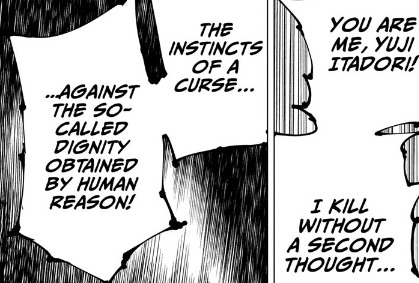
I'm keeping most of this first part to text for this reason, like go back and read the fight with Ishigori and Yuta. If I summarize Ishigori's character reasoning out of context it sounds stupid, but read the fight and it works because it's ID (I Desire) vs. Yuta's superego in not only having to collect points to help rescue Tsumiki, find a way to protect all the innocent people in the Culling Games, and also collect enough points to take on Kenjaku himself so Gojo won't have to. Meanwhile Ishigori's just fighting to get some of that sweet desert, the shallow works in contrast to the more layered motivations of our heroes.
Kenjaku is a shallow archetype fighting to satisfy his baser impulses (in his case curiosity) in comparison to the main characters who are fighting for more complicated reasons and often people besides themselves.
The question then becomes what archetype is Kenjaku. In that case answering who Kenjaku is is quite simple.
Kenjaku is a clown.
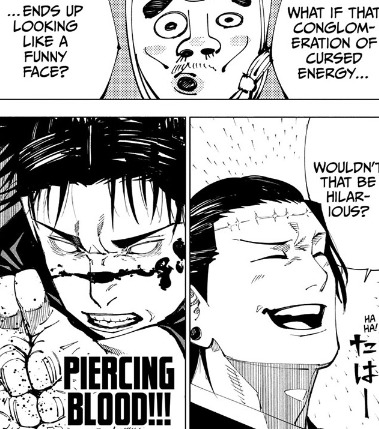
It might be more accurate to say that Kenjaku embodies what's commonly known as the "trickster archetype" but I'mma go with clown.
The most obvious example of a clown villain is what most consider the joker to be, that is a silly little clown man who challenges the straight faced and grim batman and sews chaos where Batman attempts to establish law and order in Gotham and make the city into a better place.
From the book Batman and Psychology:
More than any other villains, the Joker and Two-face reflect Batman himself as funhouse distortions, converses of who and what he is. The laughing, jesting, brightly colored Joker contrasts with grim, dark Batman. The Joker is the Joker. No alter ego. The film's opening bank robbery shows him wearing a clown mask over clown makeup, Under the surface there's only more Joker. He gives no history except inconsistent lies. When he finally considers the impact of his demand Batman unmask, he retracts the threat and demands that Batman's identity remain undisclosed. He wants a batman who has no other self, a Dark Knight whose only deeper layer is further darkness.
Is there a better descriptor for Kenjaku then these words?
Kenjaku is Kenjaku. No alter ego. A clown mask over clown makeup., Under the surface there's only more Kenjaku.
In other words, what you see is what you get.
Kenjaku even mirrors Joker's opinion of Batman, he thinks people should be more like him, not the other way around. He's not the outlier, he's being true to humanity's basic impulses of curiousity and discovery.


A more apt comparison as a clown though would probably be Loki, one of the most classic examples of clowning in the shared mythology of humanity. The character who challenges the common wisdom of gods like Odin who suspended themselves from the world tree for eleven days in order to gain wisdom. Loki, who through his trickery manages to bring about the events of Ragnarok for no deeper reason than because he can. Everyone swore not to harm Balder and Loki goes to find something that can harm him because BET.
Mythological Loki doesn't need a deeper motivation because what he represents in the mythology is someone who challenges authority and brings about a change, because in Norse Mythology nothing lasts forever and no era is permanent. Jujutsu Kaisen is also a story about how things should not in fact stay the same and tradition is bad sometimes.

When Kenjaku finds Tengen's true body he's curled up in a tree root in the fetal position, and he killed what is basically the all-knowing, all-seeing supposedly immortal sorcerer that maintains the status quo of japan, it's not exactly subtle.
Kenjaku is a clown, and clown's gotta clown. We don't need any more explanation that, it's more about what he does for the story. However, what he represents, the deep intellectual curiosity, and also a drive to disrupt the status quo in an attempt to see something more interesting can also be analyzed more deeply because they are human emotions that motivate us as well. The same way that Mahito is an inhuman monster, but he's created and motivated by the fear of other humans, something all of us have. '
Before moving onto his death though, I wanna hammer in how Kenjaku really is just motivated by these two things, a desire to see something interesting, and intellectual curiosity by comparing him to other characters.
The Clown in Fiction
I've already compared Kenjaku to Loki and the Joker, but when it comes to someone who wants to disrupt the entire order of the world simply because they're bored we've got to go to the original girlboss.

So there are plenty of villains who go "I'm evil because I'm bored" but they usually tend to be pretty shallow, either shallowly written for the lulz evil characters who just exist for shock value or just kinda dull. No one has ever done it as good as Junko Enoshima and no one ever will again.
For those who need context DanganRonpa is a death game series where the main villain basically has caused the apocalypse, wiped out most of humanity, and then induces survivors in a bunker to kill each other in a death game, where if someone commits a succesful murder they can escape the bunker, but if they're caught in a trial they're executed. Also, if they're not convicted in the trial everyone else is killed, motivating the jury to find and execute the guilty murderer.
Junko Enoshima the main villain and orchestrator of this death game ended the world because despair. She wants to inflict despair on everyone because despair. Because hope sucks and despair is where it's at.
It sounds shallow and it is and Kodaka has said in interview he wrote Junko to be a villain character with zero redeeming character traits, and no sympathetic backstory to describe why she is the way she is, but there is still something motivating her.
If you go a bit deeper into the lore and read Dangan Ronpa Zero, there is an entire book which explains the lengths which Junko goes to feel normal human emotions. The thing is much like Kenjaku Junko is too smart for her own good, everything is predictable and therefore everything bores her. Once in an attempt to live normally, she literally lobotomizes herself, makes it so that she can't remember anything and has continual amnesia constantly forgetting what just happened to her, because that's the only way she can live without knowing everything that's going to happen and constantly predicting everyone's actions.
Junko has whatever her universe's version of the six-eyes is, but instead of lording it over other people like Gojo and basking in her superiority she wants to feel normal, and connected to the world. If she can't have that she tries to make the world as unpredictable place as possible so she can experience it the same way that everyone else does.
Hope is harmony. A just heart, moving toward the light. That is all. Despair is hope's polar opposite. It is messy and confusing. It swallows up love, hatred, and everything else. Because not knowing where you will end up is despair. Despair is even what you cannot predict. Only despair's unpredictability can save you from a boring future.
I'm still not describing it properly because I don't want to go into a Danganronpa essay in this post about Jujutsu Kaisen, but one example I always use is two characters from American Dragon Jake Long. They're a pair of twins who see the future, one always sees happy things, and one always sees sad things. The one who has happy visions is a goth who's very depressed and the one who sees disaster is an incredibly peppy girl.
Jake is so confused as to why the twin who always sees good visions is so depressed, and she basically tells him to imagine having every good thing, every small little surprise, every pleasure taken out of life.
Kara: When you only see good things, nothing's special anymore. All the pleasant surprises are taken out of life. Sara: But, when you only see bad stuff, even the smallest bit of good news makes you happy!
All of this to say what Junko feels isn't just boredom, or a desire to commit evil for evil's sake, but also a full on existential crisis where she's simply too smart so she doesn't feel any connection to other people or the world around her. In order to feel that connection, that connection that everyone else has, to feel like she is actually a participant in her life not an observer she's willing to go to extremes to make the world a more interesting place, to therefore make her own life feel satisfying.
Kenjaku vs. The World (Kenjaku Pilgrim's sad little life)
To connect all this back to Kenjaku imagine the profound existential despair of a person who's lived for a thousand years, and felt bored all that time. Sukuna is at least a hedonist, he gets his fun by getting into fights, humans might be bugs to him but they're tasty bugs.
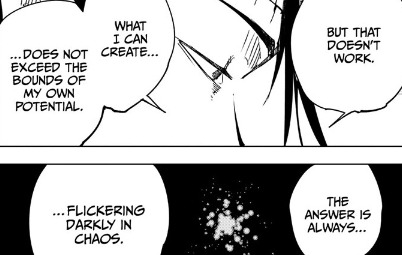
Kenjaku goes to similiar motivations and has similiar extremes, he's uninvested in the world around him, he's lived a thousand years but has no attachment to the world, to life, to the people around him. I said that Junko wants to be a participant in life not an all seeing observer and that was purposeful language because to bring back an old post. I rambled on this post about Gojo that part of Gojo's problem is that he only experiences observer-to-object relationships or I to it.
Ich and Du, translated as I and Thou is a book by philosopher Martin Buber. His two main porositions is that we may address existence in two ways:
The attitude of the “I” towards “it” towards an object that is separate in itself, which we either use or experience.
The attitude of “I” towards “Thou” in a relationship in which the other is not separated by discrete bounds.
In Buber's terms, those who only experience the first type of relationships are only observing the world around them not relating to them. Kenjaku doesn't relate to other human beings because they are objects, he only experiences subject -> object relationships and never subject -> subject.
Buber also goes on to theorize that meaning in our lives comes from subject -> subject relationships we form with other people.
Kenjaku jokingly says that to be his friend you have to never bore him and be his equal, but there's no one considers his equal because he's the subject and everyone else are just objects.

He regrets he can't sit down and talk theories with Tsukumo Yuki because she's one of the few people who think like him.

Kenjaku is a paradox of an incredibly brilliant man who is also shallow as a puddle that you can stand in and not get your socks wet. However, he tragically can't really form a more complex identity because our identities are formed by our relationships to other people and Kenjaku doesn't relate to anybody.
That's basically the theme of the whole Choso and Kenjaku fight, Choso is a weird aborted fetus of a curse who still has a strong identity and is able to feel unconditional love for Yuji because of the connection of family and the ideas of brotherhood that binds the two. Kenjaku is a bad father who abandoned Choso because they were "boring" but also never really gave them a chance to grow up or be interesting, he just dismissed them offhand and moved on to the next weird science project.
However, his reason for dismissing Choso isn't Choso's fault but rather a case of Psychological projection. It's not Choso who is boring, but rather Kenjaku himself, he said so earlier.
"What I can create, does not exceed the bounds of my own potential. The answer is always flickering darkly in chaos."
Kenjaku cannot look within to find anything satisfying abput his life because there's nothing inside of him. He doesn't have a fully formed identiy he's just ID, and because he tramples all over other people to form his desires he also cannot ever form a full ego. Just like Sukuna and most of the ancient sorcerers he's a paradox of being all ego, and yet having an underdeveloped ego with shallow motivators.
Kenjaku cannot look within because he's a boring person, and he cannot look for other people to find worth in his life because they're just objects, so instead he looks into the void, he tries to change the world around him by spreading more chaos hoping that it will make something unpredictable happen in front of his eyes - and that will give him the meaning and investment in his life he's deprived himself of because he refuses to form relationships with other people.
It's the Gojo problem. It's the Kashimo problem. It's not the Sukuna problem, because Sukuna admits he doesn't care about and rejects things like love and meaning.
If Kenjaku makes the world around him a more interesting place, he will be able to live in it. It's the same as Gojo trying to raise people up to his level by creating stronger students.
So after going to great length to demonstrate how powerful and all-consuming Kenjaku's boredom is, and how cut off he is from his own humanity, here's the part where I sort of defend his death.
Wouldn't it be funny if the joke character killed the main villain?
Let's be honest it was Takaba's kill here, Yuta just camped and killstole. I think part of the problem with people not understanding the meaning behind Kenjaku's sudden and unexpected death is attributing the death to Yuta cutting his head off out of nowhere, and not Takaba's thematic victory over Kenjaku.
Takaba represents a blindspot for Kenjaku which is why the main characters use him as a weapon against him, and he also calls out in a fashion Kenjaku's hypocrisy. First and foremost, Kenjaku presents himself as an agent of change, but he actually has no interest in many of the modern sorcerers and holds a bias towards the heian era as the peak of sorcery. He even says that he's going to bring back the Heian Golden Age to Sukuna at the end of Shibuya arc.
Because that's what Chaos is Kenjaku, things being the same as they were 1,000 years ago. Kenjaku is an agent of change and chaos and somehow his definition of change is... resetting things back to the past because the sorcerers of the past were so much better than today.

Kenjaku goes out of his way to awaken hundreds of modern day sorcerers, and then dismisses literally off of them except for Hiromi because they don't have enough potential for him compared to ancient sorcerers. He essentially did the same with the Death Painting Bros, he went through all of the trouble to create them, then dismissed them as not having enough potential BEFORE THEY EVEN GOT THE CHANCE TO GROW UP.
Kenjaku has a habit of just going BORED NOW and leaving before he even gives things the time to impress him. He does the same with the Culling Game, he set up the death game to push sorcerers to fight each other and bring out their powers, but he never actually intended to watch the sorcerers evolve. He just wanted to slaughter everyone inside to start the merger.
He goes through a lot of potential to set up these situations and then abandons them before they have the chance to even evolve, because they do not have enough "potential" in his opinion, but like his opinion is often shown to be wrong. Takaba represents that blindspot because he was one of the modern sorcerers that Kenjaku underestimated and dismissed offhand as boring without giving him a chance to shine.
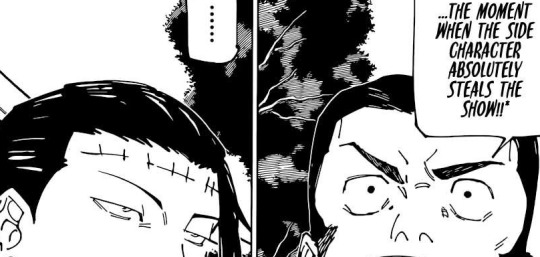
That is the joke that Takaba introduces himself with "Wouldn't it be funny if a random comic relief side character suddenly defeated the big bad?"
He's immediately pointing out a blindspot, because Kenjaku automatically believes himself to be an important character, he underestimates Takaba because he's a side character, one of the people Kenjaku has dismissed as boring and uninteresting (before they even had a chance to evolve into something else). Like that's the other thing Kenjaku wants things to evolve but he doesn't... let them. He abandoned Choso and the rest before they even grew up, they were literally fetuses and he threw them away. Kenjaku is the protagonist of reality, and Takaba is a side character, and therefore Takaba couldn't possibly harm him because Kenjaku and his boundless curiosity are the center of the world.
It's not just about subverting the audience's expectations to have the main villain die in such an anti-climactic way before the final act even starts, but it's pointing out how narrow Kenjaku's viewpoints really were all along. He wants everything to be surprised but he never lets anything surprise him, because either he gets bored right away, or he looks down on others before giving them the chance to evolve, or the third thing he just straight up has to control everything. He can't let the culling game evolve naturally he's going to slaughter all the players by hand so he can move onto the next part.
It's the contradiction between a schemer who needs to control everything and everyone to bring about his intended result and everything needs to be a part of his big plans, to someone who wants to be surprised by others and have things go off the rails. You can't have both of these things at once, Kenjaku cannot have things surprise him if he rigs everything to go his way with his overly elaborate schemes and his tight-fisted control of everyone in the story.
Like, in comparison to Kenjaku the joker just blows things up and sprays people with laughing gas. They're both playing the same game but the joker is having fun and Kenjaku isn't.
Kenjaku wants an unexpected future, but he doesn't care about any of the modern sorcerers and has a bias towards the heiean era that he considers the height and wants to reset things to bring back the heian era. He wants to be surprised but won't give up control.
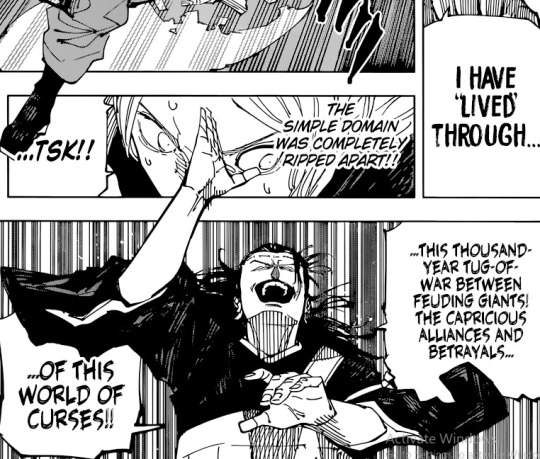
Kenjaku's boast is that unlike Tengen he's spent a thousand years living on the ground instead of lording up on them from above like some deity, but is that true? Has Kenjaku lived? Has he engaged with the world? Formed relationships with people? Or does he just sit in the corner rubbing his hands together menacingly and scheming his schemes.
Takaba unironically gives Kenjaku what he wants, something he's never seen before in a thousand years, and it's from a place Kenjaku never expected. Some random guy, who he dismissed as one of the boring modern sorcerers with no potential like Higuruma.
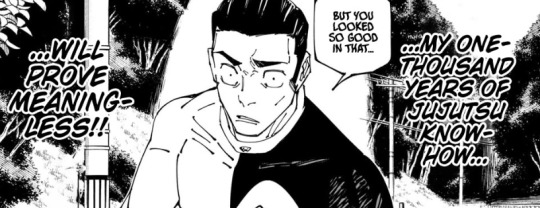
Takaba not only exists in Kenjaku's blindspot, he almost immediately points out Kenjaku's second hypocrisy. If he's willing to resort to mass murder just to feel entertained, then if he found something else to entertain him there'd be no reason to get violent and scheme his schemes.

In other words Kenjaku hasn't really gone looking for other places to try to find what makes life worth living, or at least enertaining, he hasn't really tried any alternatives to finding joy in life because Jujutsu is all he cares about. Takaba says that if he found something else even more entertaining than the merger there'd be no need to go through with the merger, and he turns out to be right. Kenjaku could have found meaning and entertainment with the world someplace else, he was just too narrow minded and never looked anywhere else.
As I said from the beginning Kenjaku's existential crisis comes from his inability to relate to other people and viewing them all as objects, but in Kenjaku's mind of course he can't relate to others they're too boring, so therefore it's the world's fault, and the fault of others and not himself.
However, right away one of those boring people starts relating to Kenjaku.

I joked about how we know nothing about the Gojo clan but Takaba gets an entire backstory chapter about his failed comedy career, but this chapter is plot important because jokes are the way that Takaba relates to and forms relationships with other people. Takaba makes jokes to relate to others but has a fallout with a comedy partner and has never been able to form a lasting relationship with a comedic partner because comedy doesn't mean the same to them as it does to him - because to Takaba comedy is about forming relationships with people. Which is why he thinks he's failed if he's failed to make everyone in the audience laugh because he wants to make comedy that will make other people relate to him and understand him.
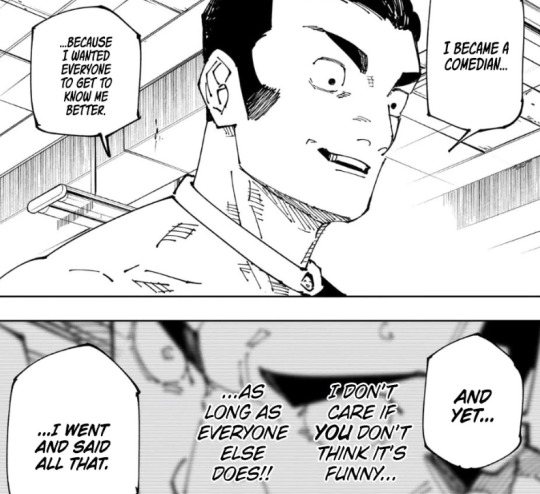
However, he almost gives up on comedy because he's afraid that he might fail on that endeavor. He gives up on striving to make everybody in the audience laugh, because of self-affirmation and a desire to protect himself. He didn't want to fail so he started distancing himself from the audience under the excuse "Well, I can't make everyone laugh so it's okay if not everyone understands me."

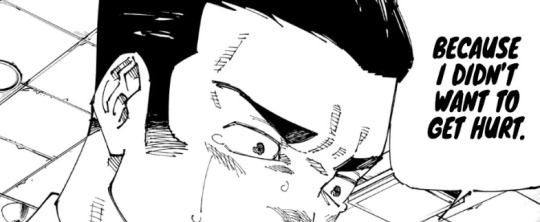
Takaba at some point gave up on trying to use comedy as a means of understanding and relating to others, because of his fear of failure and at that point he nearly lost - but he rallies himself by saying that he won't give up on making someone like Kenjaku laugh. If his comedy is about connecting to others, about understanding others and having others understand him then he can't just give up on Kenjaku and say it's Kenjaku's fault that Kenjaku can't relate to his sense of humor. He's got to try even harder to make Kenjaku laugh.

This is also pretty much the opposite of Kenjaku's point of view. For Kenjaku it's everyone else's fault for being so boring that's why he can't relate to them. Wheras, Takaba takes personal responsibility, he wasn't funny enough, he has to try harder, he's the one who's going to make Kenjaku laugh by improving himself. Takaba looks inward, and Kenjaku looks outwards because there's nothing inside Kenjaku.
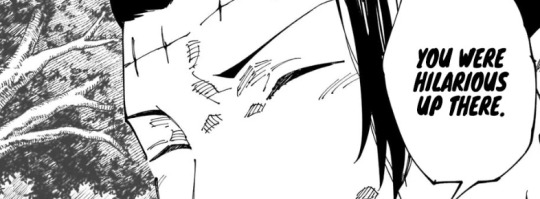
This is a parallel to this.
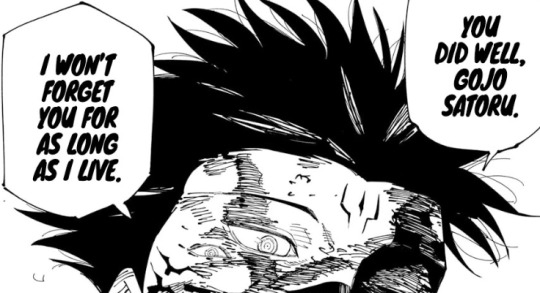
The difference however, is that Sukuna did not betray his ideology. Sukuna lives for the kicks that battle provides him and wants to face strong opponents so he can eventually devoured them and be momentarily entertained.
Like Sukuna is not bored the way Kenjaku is. The world is his playground. He may refer to living as just killing time until you die, but he also says that there's an infinite variety of humans to entertain yourself with. The world is Sukuna's toybox and he's satisfied with just that. In fact he doesn't even care about the merger, until his frustration with Yuji makes him think a little deeper about himself.

Kenjaku is not the Sukuna in this scene, he's the Gojo. He believed he was above others, only to be reminded suddenly that he was just the same as everyone else and brought back down to humanity. I mean, they even die off panel the same anticlimactic way. Gojo's infinity meant nothing in the face of one surprise attack a world-cleaving slash Gojo didn't see coming. All of Kenjaku's backup plans meant nothing in the face of Yuta camping and kill-stealing.


Kenjaku didn't lose because Yuta's plan of camping and killstealing was simply too brilliant for him to prepare for however, we're given the exact reason kenjaku lost - because he was having too much fun with Takaba.
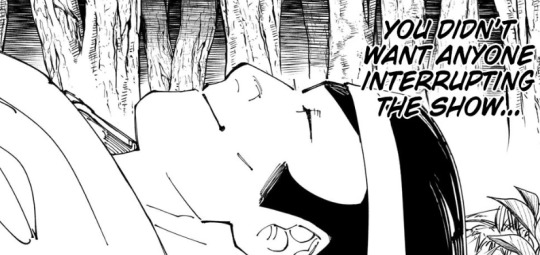
Which meant what Takaba said earlier was true, if Kenjaku found something funnier, something other than the merger that could make him laugh there'd be no need to go through with the merger to begin with.
Kenjaku loses because all along he could have related to people, formed meaningful relationships with others, looked for meaning in life outside of Jujutsu but just chose not to. Which is also a parallel to this.
Sukuna says that Kashimo and Gojo both lost because they were greedy. They already received love in a way, they had the love of everyone who regarded them as the strongest, they had people who earnestly wanted to challenge them and respected them - which Sukuna sees as a form of love, and yet they still wanted more.

They were the ones who put themselves up on that pedestal and decided to stand above all of humanity, they don't get to whine about being lonely on top of that.
To add my interpretation to Sukuna's speech, what he's outlining is a general conflict in Jujutsu Kaisen, you can choose to be all ego to put personal development above everything else but it comes at the cost of not being able to form relationships. Maki's as powerful as Toji now, but the sister she always wanted to protect is dead and basically committed suicide. Meanwhile Noritoshi Kamo didn't participate in the final battle, but he reconnected with his mother and half-brother.
There are plenty of characters who die and suffer in jujutsu kaisen because they chose to value other people above themselves, because Jujutsu Kaisen rewards selfishness and punishes selflessness / having an underdeveloped sense of self.
I'll pick Mechamaru as my biggest example, he lived to protect Miwa, and not only does he die an unsatisfying death, he also breaks her heart.
However, at least Mechamaru experienced love. His desire to protect Miwa is granted, because Miwa is also out of the final conflict. Mechamaru is one of the most miserable characters in the manga, and yet he experienced love in his life for someone else that made his brief life meaningful. The characters who choose love, and other people over strength tend to get stepped on, but they at least had that love in their life to begin with.
It's a having your cake and eating it too situation. Kashimo chose strength over love, and he got to be so strong he was unbeatable and lived to old age, but not only is he unfulfilled but he whines about being unable to relate to the people around him - you're the one who chose to step on everyone like bugs.
Characters in Jujutsu Kaisen don't just experience death when they try to be selfless however, like yeah there's a disproportionate amont of selfless minor characters who die, but like Yuji is the most selfless character in the manga and he's continually punished for it and yet he's the one referred to as a person with an unbreakable will.

Rather instead of Jujutsu Kiasen preferring the selfish side on the scale of selfishness / selflessness, the kind of messy, deaths that get handed out to people like Mechamaru happen when you betray the ideals you were living for. Whether they were selfish or selfless.

It goes back to Toji's internal monologue. You lose when you lose sight of yourself - like there's some deaths that don't fit the mould but for the most part, Gojo, Kashimo, Toji's and then Kenjaku's deaths all follow this pattern. By coincidence they also all take place offscreen for the most part (I suppose we see Yuta cut off Kenjaku's head but it's quick and unsatisfying compared to all the rest).
Kenjaku died because he betrayed what he was living for and he temporarily lost sight of himself. As I said Kenjaku's airtight principles were that everyone was boring and people weren't worth relating too so the only way to find enertainment in life is to cause chaos - but he found himself relating to some nobody he wrote off as a minor character Takaba and having fun with him. Which meant the belief he was false, he could have tried relating to other people all along he just didn't.
He warped his sense of self to reaffirm his identity. Takaba almost did that too, he tried to blame other people for not finding him funny to protect himself, but he moved past that and redoubled his efforts to make Kenjaku laugh.
There's also the added layer of irony that Kenjaku's sudden death brings about, the person who spent a thousand years trying to make the merger happen doesn't get to see it.
However, here's my assertion on why Kenjaku's death before the merger always had to happen.
Because, even if Kenjaku had seen the merger he still would have been bored.
Literally everything about Kenjaku's character and previous actions shows that even if he made his big scheme come true, he would have gone "meh" and moved onto the next scheme because that's how he always reacts.
He got bored of the death painting siblings, he presumably got bored of Yuji, he got bored of all the ancient sorcerers and new sorcerers he made for the culling game, he worked with the disaster curses and got bored of them and dismissed them as inferior primitive curses, he goes out of the way to engineer these chaotic situations and then never feels any satisfaction from them so why would the Merger be any different?
Not only did Kenjaku die before he saw the merger, he was basically doomed to never see the merger, because it would not have fixed whatever is wrong inside of him.
Because it's not the world that's boring, it's Kenjaku himself.
He gets a brief glimpse of what he could have done in life, that he could have tried to forge connections with the people around him and related to them on a personal level - and then he dies the way he lived, in a kind of boring and unsatisfying way.
It's the narrative punishing him in a way, the same way it punished Gojo, and Kashimo, by not letting him see the big explosion after he went to all the trouble rigging the bombs. It's punishing him for the same reason too - by deviating from his true self and showing what he thought were his reasons were shallow all along. Gojo could have always related to people he just chose to stand on his pedestal alone, and Kenjaku could have always found the world to be more enertaining he was the one dismissing other people as boring without giving them a chance to grow.
Takaba confronted his beliefs and then stayed true to his ideology of making everyone, 100% of the people in the crowd laugh. Kenjaku didn't confront his beliefs, he strayed from them because he didn't have the strength of character to evaluate himself the way Takaba did.
Hence, he's finished off by one of those boring people who used their power in a way he never expected. The main villain is defeated by the comic relief character and it's hilarious.
#jjk meta#kenjaku#fumihiko takaba#ryomen sukuna#jujutsu kaisen#jujutsu kaisen theory#jujutsu kaisen analysis#jjk spoiler#jujutsu kaisne spoiler#big spoiler actually
295 notes
·
View notes
Text
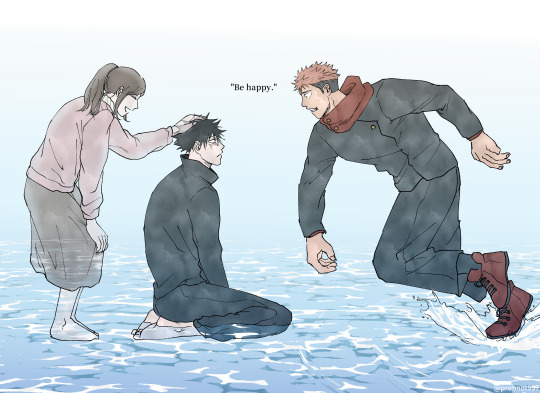
Itafushi Twitter(X)
#jujutsu kaisen#jjk#itadori yuji#fushiguro megumi#jjk fanart#itafushi#itadori x fushiguro#jjk spoilers#jjk manga#jujutsu kaisne spoiler
169 notes
·
View notes
Note
Thanks @hxhhasmysoul for sharing your analysis. I just read your post about CSM, and I really agree with you. Especially after I found twitter thread that basically said CSM > JJK & HxH. And I was mad reading that....
So just random ask, but do you think in the end Yuuji is the one that will kill Sukuna for good? Also, is there any of your prediction that came true in the manga?
I think that in the CSM vs JJK or HxH debate it's very much about personal taste. But there's this culture that has grown around JJK where it's just a point of social media pride to shit on it. There's a lot of aggressive clout chasing in the form of criticising JJK for things that aren't in it, or by willfully misinterpreting the things that are. It's aggravating at times.
Because the people who do it, act as if they didn't comprehend that them not liking something doesn't mean that it's objectively bad. That their personal taste isn't some measure of quality. Idk, maybe some of them really don't get it, though I think most of them are just assholes who want to put a mask of intellectualism for being above the popular thing, I talked about it more here.
I honestly have no idea how Sukuna will die or even if he will die. I mean he's going through a lot right now so it should make him vulnerable but to what and how it's hard to predict. But yeah, Yuuji is the most likely to kill him, or Yuuji and Maki together (maybe with Nobara, I'm still not ready to pronounce her dead), or him setting Sukuna up for Maki.
I kinda think it'd be funny if Yuuji switched bodies with Megumi and absorbed Sukuna, like he did with his brothers but that's just me being hopeful for the kindest ending for Yuuji, maybe Gojou's words will come true. Though what people say about him sacrificing himself to kill Sukuna seems likely alas. My biggest hope is that Yuuji will survive JJK but I think it's 50/50 at best.
Yeah, the one that Yuuji is truly the only one who can win against Sukuna because he alone has always unsettled Sukuna. I've been mentioning this here an there in my meta and rants for a while now and it was finally spelled out in the latest chapter. I don't remember if I've made any other predictions than that. Though I wouldn't be surprised if I did and they were wrong, I'm not great at predictions.
4 notes
·
View notes